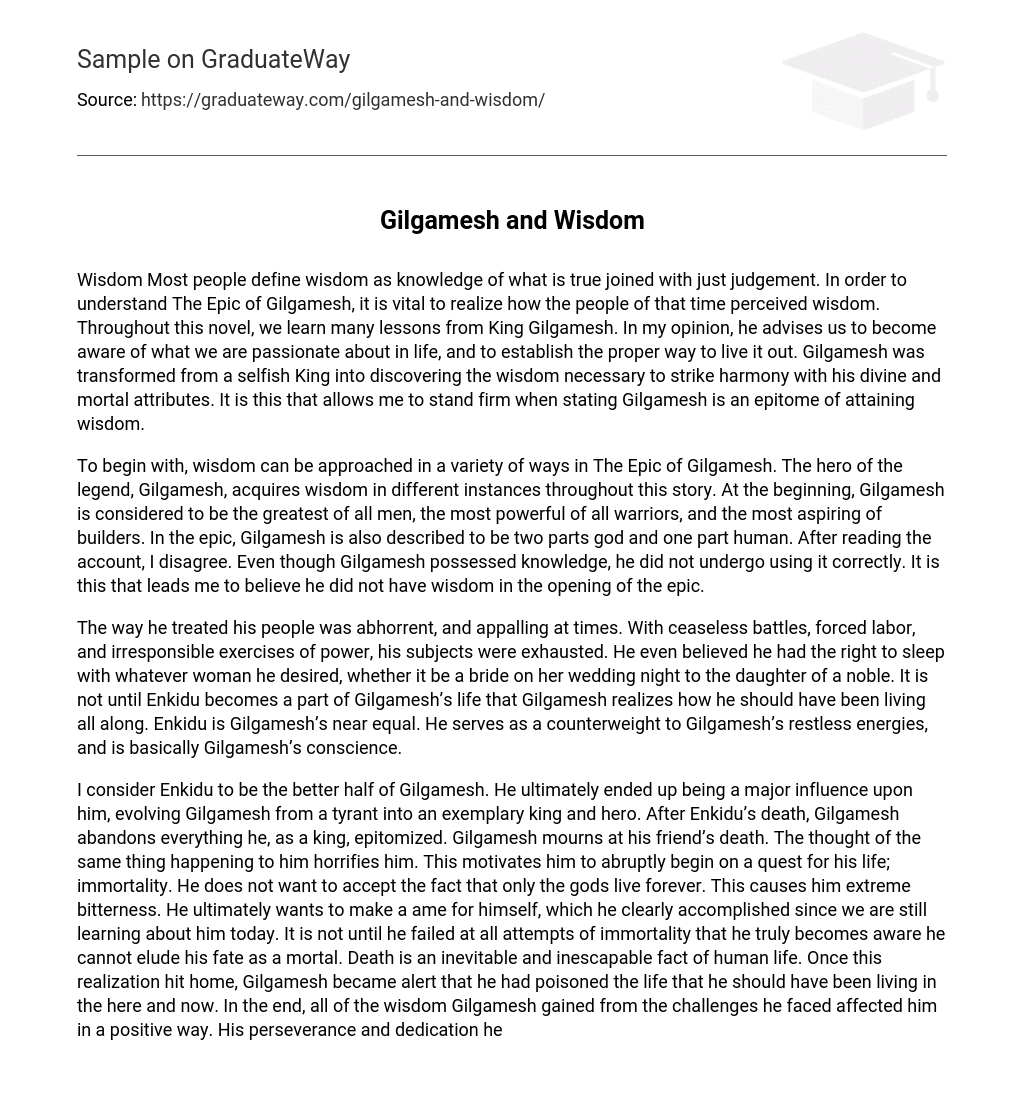Wisdom Most people define wisdom as knowledge of what is true joined with just judgement. In order to understand The Epic of Gilgamesh, it is vital to realize how the people of that time perceived wisdom. Throughout this novel, we learn many lessons from King Gilgamesh. In my opinion, he advises us to become aware of what we are passionate about in life, and to establish the proper way to live it out. Gilgamesh was transformed from a selfish King into discovering the wisdom necessary to strike harmony with his divine and mortal attributes. It is this that allows me to stand firm when stating Gilgamesh is an epitome of attaining wisdom.
To begin with, wisdom can be approached in a variety of ways in The Epic of Gilgamesh. The hero of the legend, Gilgamesh, acquires wisdom in different instances throughout this story. At the beginning, Gilgamesh is considered to be the greatest of all men, the most powerful of all warriors, and the most aspiring of builders. In the epic, Gilgamesh is also described to be two parts god and one part human. After reading the account, I disagree. Even though Gilgamesh possessed knowledge, he did not undergo using it correctly. It is this that leads me to believe he did not have wisdom in the opening of the epic.
The way he treated his people was abhorrent, and appalling at times. With ceaseless battles, forced labor, and irresponsible exercises of power, his subjects were exhausted. He even believed he had the right to sleep with whatever woman he desired, whether it be a bride on her wedding night to the daughter of a noble. It is not until Enkidu becomes a part of Gilgamesh’s life that Gilgamesh realizes how he should have been living all along. Enkidu is Gilgamesh’s near equal. He serves as a counterweight to Gilgamesh’s restless energies, and is basically Gilgamesh’s conscience.
I consider Enkidu to be the better half of Gilgamesh. He ultimately ended up being a major influence upon him, evolving Gilgamesh from a tyrant into an exemplary king and hero. After Enkidu’s death, Gilgamesh abandons everything he, as a king, epitomized. Gilgamesh mourns at his friend’s death. The thought of the same thing happening to him horrifies him. This motivates him to abruptly begin on a quest for his life; immortality. He does not want to accept the fact that only the gods live forever. This causes him extreme bitterness. He ultimately wants to make a ame for himself, which he clearly accomplished since we are still learning about him today. It is not until he failed at all attempts of immortality that he truly becomes aware he cannot elude his fate as a mortal. Death is an inevitable and inescapable fact of human life. Once this realization hit home, Gilgamesh became alert that he had poisoned the life that he should have been living in the here and now. In the end, all of the wisdom Gilgamesh gained from the challenges he faced affected him in a positive way. His perseverance and dedication helped him gain fame and immortality, but not in the sense he always had hoped.
In conclusion, understanding wisdom is valuable to interpret this epic. Throughout the story, I learned that throughout life people change with experience. We need to be prepared for the obstacles we may be faced with, and decide to accept or resist them. Gilgamesh came to the realization at the end of the epic that the worth of a man’s life is many times said to be measured by the things he has done and the legacy he has left behind. After realizing that he was not a god-man, Gilgamesh understood that the real glory is in the deeds you have done and the people you have effected in good ways over your life.
Gilgamesh emphasizes that we have to use our wisdom to become conscious of what is genuinely important in our life and how to live it out. Gilgamesh taught us that it is urgent to not be passive in life. To act is to live, and through action Gilgamesh lived his life. The future is unpredictable and in life there is no permanence. We have to act responsibly because our actions will have consequences, whether we want them or not. All of this noted, without a doubt, reading this text made me rest assured that Gilgamesh was the epitome of attaining wisdom.





